When you find yourself incessantly scratching your head, accompanied by those unsightly white flakes settling on your clothes, it's natural to assume the culprit is either dandruff or a dry scalp. But there's a third possibility lurking in the shadows, one that often goes unnoticed due to its strikingly similar symptoms – scalp psoriasis. You might wonder, how does this differ from dandruff or dry scalp, and what can be done to treat it? Fear not with the help of our Doctor's Guide, you will be well-equipped to manage your symptoms and enjoy a flake-free, itch-free scalp. So, let's dive in and explore the world of scalp psoriasis treatment together!
Scalp psoriasis is an inflammatory skin condition that affects the scalp, causing red, raised, scaly patches. It is often mistaken for dandruff or dry scalp because it shares common symptoms like itching, flaking, and redness. However, scalp psoriasis is a separate condition and requires specific treatments to manage its symptoms effectively. To help you navigate this complex issue and find relief, we have collaborated with top dermatologists and medical professionals to provide you with the ultimate guide to treating scalp psoriasis.
First, it's essential to understand the underlying causes of scalp psoriasis. This condition is an autoimmune disorder that results from an overactive immune system, causing skin cells to grow too rapidly and accumulate on the scalp. The buildup of these excess skin cells leads to the formation of thick, scaly patches known as plaques. So, unlike dandruff and dry scalp, which stem from imbalances in the scalp's moisture levels or skin cell production, scalp psoriasis is driven by an entirely different mechanism.
Despite its potentially distressing symptoms, scalp psoriasis is manageable with the right care and attention.
Causes of Scalp Psoriasis
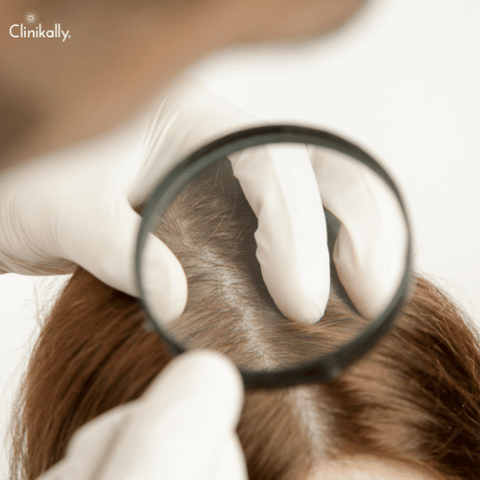
To effectively treat scalp psoriasis, it's important to understand what causes this condition in the first place. While the exact cause is still not entirely understood, researchers believe that a combination of genetic, environmental, and immune system factors contribute to its development. Let's take a closer look at these factors and their role in causing scalp psoriasis:
#1 Genetics
-
A family history of psoriasis can increase your risk of developing the condition.
-
Certain genetic mutations have been identified that are associated with a higher likelihood of developing psoriasis.
#2 Immune System
-
Psoriasis is an autoimmune disorder, which means that the immune system mistakenly attacks healthy skin cells.
-
This immune response leads to an overproduction of skin cells, resulting in the characteristic plaques and inflammation associated with psoriasis.
#3 Environmental Triggers
Several environmental factors can trigger or worsen psoriasis symptoms. Some common triggers include:
|
Trigger |
Description |
|
Stress |
High stress levels can trigger or exacerbate psoriasis symptoms. |
|
Infections |
Bacterial or viral infections, such as strep throat, can trigger a psoriasis flare-up. |
|
Skin Injury |
Cuts, scrapes, or sunburns can cause a flare-up of psoriasis in the affected area. |
|
Medications |
Certain medications, like beta-blockers or lithium, can worsen or trigger psoriasis symptoms. |
|
Weather Conditions |
Cold, dry weather can cause psoriasis to flare, while warm, sunny weather may help improve it. |
Now that we've examined the various factors that contribute to the development of scalp psoriasis, let's discuss some strategies to help manage these triggers and reduce the frequency and severity of flare-ups.
Symptoms of Scalp Psoriasis
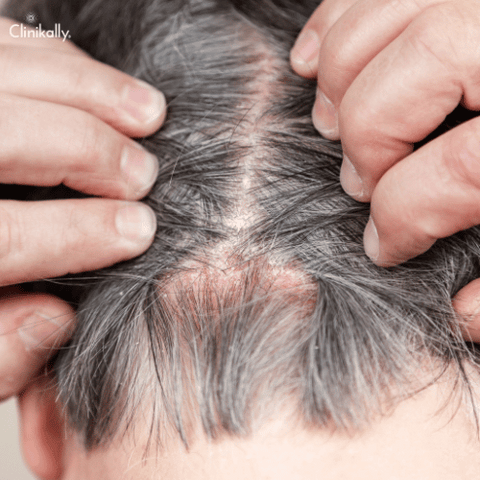
Recognizing the symptoms of scalp psoriasis is crucial for obtaining an accurate diagnosis and seeking appropriate treatment. Although the symptoms can vary from person to person, there are several common signs that may indicate the presence of scalp psoriasis. Here, we outline the key symptoms to watch out for:
-
Red, inflamed patches: One of the most characteristic symptoms of scalp psoriasis is the appearance of red, inflamed patches on the scalp. These patches may be localised to specific areas or cover a larger portion of the scalp.
-
Scaly plaques: The red patches are often covered with thick, silvery-white scales known as plaques. These plaques result from the rapid buildup of skin cells and can be quite noticeable.
-
Itching: Scalp psoriasis can cause moderate to severe itching, which can be particularly bothersome and even lead to hair loss due to excessive scratching.
-
Burning or soreness: The affected areas may feel tender, sore, or have a burning sensation, which can be exacerbated by scratching or combing the hair.
-
Dry scalp: The scalp may become dry and prone to cracking or bleeding, especially if the plaques are picked at or scratched.
-
Temporary hair loss: Although scalp psoriasis does not directly cause hair loss, excessive scratching or the removal of plaques can lead to temporary hair thinning or shedding.
It's important to note that the severity and presentation of these symptoms can vary significantly among individuals. Some people may experience only mild symptoms, while others may have more severe or widespread scalp psoriasis. Additionally, symptoms may come and go, with periods of remission followed by flare-ups triggered by various factors.
If you suspect that you may have scalp psoriasis, it's essential to consult a dermatologist or healthcare professional for a proper evaluation and diagnosis. This will ensure that you receive the most appropriate treatment options for your specific condition, as well as guidance on managing symptoms and preventing flare-ups. Remember that early intervention is key to successfully managing scalp psoriasis and maintaining a healthy, comfortable scalp.
Treatment of Scalp Psoriasis
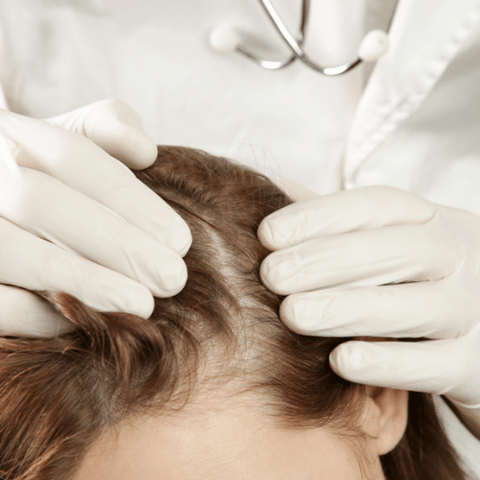
Treating scalp psoriasis can be challenging due to its chronic nature and the varying degrees of severity among individuals. However, with a combination of medical treatments, lifestyle adjustments, and proper scalp care, it is possible to manage symptoms and reduce flare-ups. Below, we outline several treatment options for scalp psoriasis.
#1 Topical Treatments
Topical treatments are applied directly to the scalp and are usually the first line of defence against scalp psoriasis. They can help reduce inflammation, itching, and scaling. Some common topical treatments include:
-
Over-the-counter shampoos containing coal tar or salicylic acid
-
Prescription-strength corticosteroid creams or ointments
-
Topical calcineurin inhibitors, such as tacrolimus or pimecrolimus
-
Vitamin D analogs, like calcipotriene or calcitriol
-
Topical retinoids, such as tazarotene
#2 Light Therapy
Light therapy, also known as phototherapy, involves exposing the affected areas of the scalp to ultraviolet (UV) light. This can help slow down the rapid skin cell growth that occurs in psoriasis. Types of light therapy include:
-
Narrowband UVB therapy: A controlled dose of UVB light is administered to the affected areas.
-
Excimer laser: A more targeted form of UVB therapy, which is useful for localised scalp psoriasis.
#3 Systemic Medications
For more severe cases of scalp psoriasis or cases that do not respond to topical treatments and light therapy, systemic medications may be prescribed. These medications work by targeting the immune system and controlling the inflammation and overproduction of skin cells. Examples of systemic medications include:
-
Methotrexate
-
Cyclosporine
-
Oral retinoids, such as acitretin
-
Biologic agents, like adalimumab, etanercept, or ustekinumab
#4 Lifestyle Adjustments
In addition to medical treatments, making certain lifestyle adjustments can help manage scalp psoriasis symptoms and reduce the likelihood of flare-ups. These adjustments include:
-
Stress management techniques, such as meditation, yoga, or exercise
-
Following a balanced, anti-inflammatory diet
-
Avoiding known triggers, like specific medications or skin injuries
-
Keeping the scalp moisturised and avoiding harsh hair care products
It is important to remember that every individual's experience with scalp psoriasis is unique, and what works for one person may not work for another. Consult with your dermatologist or healthcare provider to develop a personalised treatment plan that addresses your specific needs and symptoms. With the right combination of treatments, lifestyle adjustments, and ongoing medical support, you can effectively manage scalp psoriasis and maintain a healthy, comfortable scalp.
Tips to Manage Scalp Psoriasis
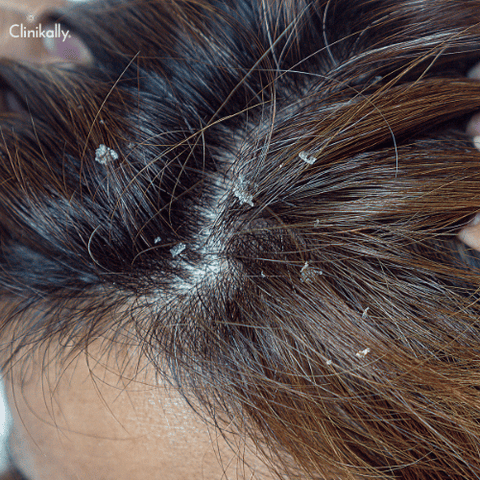
Living with scalp psoriasis can be challenging, but with some practical tips and a proactive approach to self-care, you can effectively manage your symptoms and enjoy better scalp health. Here are some useful tips to help you manage scalp psoriasis:
#1 Avoid scratching your scalp
It's crucial to resist the urge to scratch your scalp, even if it itches. Scratching can cause bleeding, worsen inflammation, and potentially lead to infection. To help alleviate itching, try using over-the-counter anti-itch creams or cold compresses.
#2 Treat your scalp gently
When washing or combing your hair, be gentle to prevent hair breakage and avoid causing further irritation to your scalp. Opt for a soft-bristle brush and detangle your hair carefully, starting from the ends and working your way up.
#3 Choose the right hair care products
Select gentle, fragrance-free shampoos and conditioners specifically designed for sensitive scalps. Avoid products containing harsh chemicals, sulphates, or alcohol, as these can exacerbate scalp psoriasis symptoms.
#4 Moisturise your scalp
Keep your scalp hydrated by using a moisturising oil or conditioner. This can help reduce dryness and scaling. Try applying natural oils, such as coconut or olive oil, to your scalp before shampooing to provide extra hydration.
#5 Protect your scalp from the sun
Excessive sun exposure can worsen scalp psoriasis symptoms for some individuals, while moderate sun exposure may help improve symptoms for others. To protect your scalp from the sun, wear a hat when outdoors, and speak with your healthcare provider about the potential benefits and risks of sun exposure for your specific situation.
#6 Manage stress
Stress can trigger or worsen psoriasis symptoms, so it's important to find effective ways to manage stress. Incorporate stress-reduction techniques like yoga, meditation, or regular exercise into your daily routine.
#7 Maintain a healthy lifestyle
Eating a balanced diet rich in fruits, vegetables, whole grains, and lean proteins can help support overall health and potentially reduce inflammation. Additionally, maintain a healthy weight, exercise regularly, and avoid smoking and excessive alcohol consumption.
#8 Consult your hair care specialist
Regularly communicate with your dermatologist or healthcare provider about your symptoms, any changes in your condition, and the effectiveness of your treatment plan. They can offer guidance, adjust your treatments as needed, and provide ongoing support.
By following these tips and working closely with your healthcare provider, you can take control of your scalp psoriasis, minimise flare-ups, and maintain a healthier, more comfortable scalp.
How to Cure Scalp Psoriasis With Shampoo
While there is no definitive cure for psoriasis, using specialised shampoos can help manage symptoms, reduce flare-ups, and improve scalp health. These shampoos contain active ingredients specifically designed to address the unique challenges of scalp psoriasis. Here, we discuss three types of psoriasis shampoos and their benefits:
-
Coal Tar Shampoos:
Coal tar is a byproduct of coal processing and has been used for decades to treat psoriasis and other skin conditions. Coal tar shampoos are widely available over the counter and help to:
-
Slow down the rapid growth of skin cells
-
Alleviate itching and inflammation
-
Reduce the appearance of plaques and scales
When using coal tar shampoos, be sure to follow the instructions on the label and consult your healthcare provider if irritation or worsening of symptoms occurs. Keep in mind that coal tar shampoos can have a strong odour and may stain light-coloured hair or fabrics.
-
Salicylic Acid Shampoos
Salicylic acid is a keratolytic agent that helps to break down and remove the thick scales associated with scalp psoriasis. Salicylic acid shampoos can:
-
Soften and lift scales for easier removal
-
Reduce redness and inflammation
-
Improve the overall appearance of the scalp
It's important to note that salicylic acid shampoos may cause skin irritation in some individuals. If you experience discomfort or worsening symptoms, discontinue use and consult your healthcare provider.
-
Steroid Shampoos
Steroid shampoos, also known as corticosteroid shampoos, contain anti-inflammatory corticosteroids that help to reduce inflammation, itching, and redness. These shampoos are typically available by prescription and can be highly effective for moderate to severe scalp psoriasis. Benefits of steroid shampoos include:
-
Rapid relief from itching and discomfort
-
Reduction of inflammation and redness
-
Improvement in the overall appearance of the scalp
When using steroid shampoos, follow your healthcare provider's instructions carefully, as overuse or improper application can lead to side effects or decreased effectiveness.
In addition to these specialised shampoos, it's essential to maintain a consistent hair care routine and follow the tips mentioned in the previous sections to manage scalp psoriasis effectively. Remember that finding the right shampoo and treatment plan may involve some trial and error, so be patient and communicate with your healthcare provider to find the best approach for your specific needs. With the right shampoo and care, you can successfully manage scalp psoriasis symptoms and enjoy a healthier, more comfortable scalp.
Home Remedies for Scalp Psoriasis
In addition to medical treatments and specialised shampoos, some home remedies can provide relief from the symptoms of scalp psoriasis. These remedies use natural ingredients that are readily available and can be easily incorporated into your self-care routine. However, it's important to remember that home remedies should not replace professional medical advice or treatments prescribed by your healthcare provider. Here, we explore three home remedies that may help manage scalp psoriasis symptoms:
#1 Baking Soda
Baking soda, or sodium bicarbonate, has mild antifungal and antibacterial properties that can help soothe an itchy, irritated scalp. To use baking soda for scalp psoriasis:
-
Mix one part baking soda with three parts water to create a paste.
-
Apply the paste to the affected areas of your scalp and let it sit for 10-15 minutes.
-
Rinse your hair and scalp thoroughly with lukewarm water.
This remedy can be used once or twice a week to help alleviate itching and reduce inflammation. However, if you experience any irritation or worsening of symptoms, discontinue use and consult your healthcare provider.
#2 Avocado Oil
Avocado oil is rich in antioxidants, vitamins, and fatty acids that can help moisturise and nourish the scalp. Its anti-inflammatory properties may also help soothe irritation and reduce redness. To use avocado oil for scalp psoriasis:
-
Warm a small amount of avocado oil in your hands.
-
Gently massage the oil into the affected areas of your scalp.
-
Leave the oil on for at least 30 minutes or overnight for a more intensive treatment.
-
Wash your hair with a gentle, fragrance-free shampoo to remove the oil.
Repeat this treatment once or twice a week to help keep your scalp moisturised and reduce symptoms.
#3 Garlic
Garlic has potent antimicrobial and anti-inflammatory properties that may help alleviate itching and inflammation associated with scalp psoriasis. To use garlic as a home remedy:
-
Crush a few cloves of garlic to create a paste.
-
Mix the garlic paste with a carrier oil, such as olive or coconut oil, to dilute the garlic and prevent skin irritation.
-
Apply the mixture to the affected areas of your scalp and let it sit for 30 minutes.
-
Rinse your hair and scalp thoroughly with a gentle shampoo.
This remedy can be used once a week, but be cautious as some individuals may experience skin irritation or an allergic reaction to garlic. If you notice any adverse reactions, discontinue use and consult your healthcare provider.
While these home remedies can provide some relief from scalp psoriasis symptoms, it's essential to consult with your dermatologist or healthcare provider to develop a comprehensive treatment plan tailored to your specific needs. Always discuss the use of home remedies with your healthcare provider to ensure they are safe and appropriate for your situation.
Treat Scalp Psoriasis for Healthy Scalp!
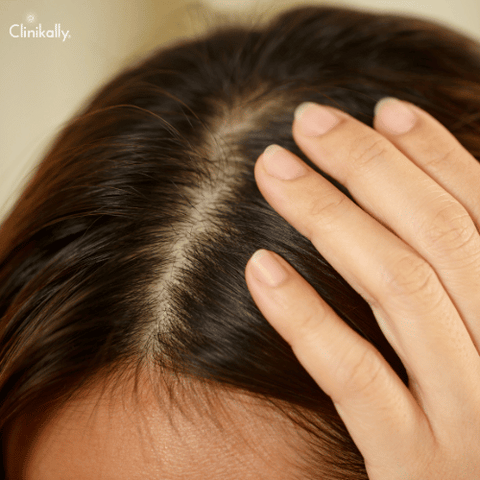
Scalp psoriasis can be a challenging and persistent condition, but with a proactive approach to treatment and self-care, it is possible to manage symptoms effectively and maintain a healthy, nourished scalp. By understanding the causes and symptoms of scalp psoriasis, seeking professional medical advice, and utilising a combination of treatments, specialised shampoos, and home remedies, you can take control of your condition and reduce flare-ups.
Remember, open communication with your dermatologist or healthcare provider is essential to ensure that you receive the most appropriate treatments tailored to your specific needs. Be patient and persistent, as finding the right treatment plan may take some time and adjustments.
With the right support, knowledge, and commitment to self-care, you can successfully manage scalp psoriasis and enjoy a healthier, more comfortable scalp. Embrace your journey toward improved scalp health and let it serve as a catalyst for overall well-being and self-confidence.
















